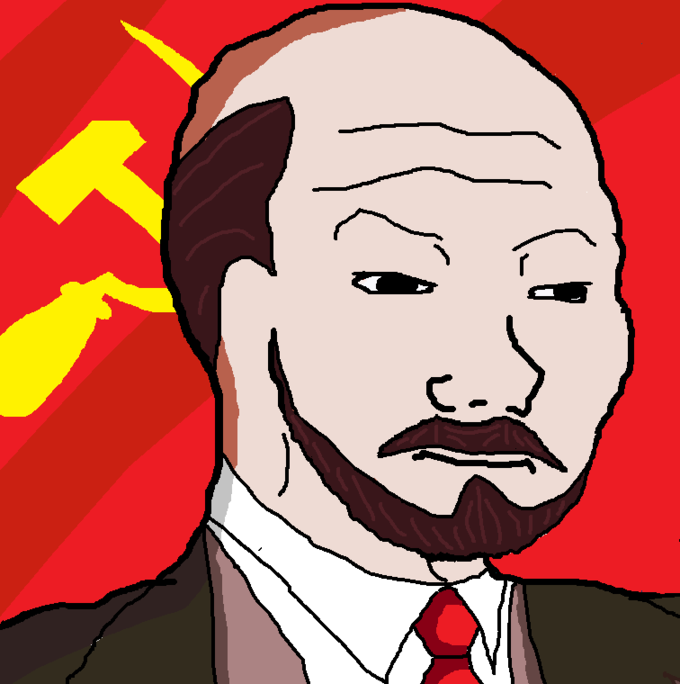I’ve been having trouble explaining to liberal co-workers that there isn’t really an “Upper” or “Lower” working class. They insist that class as a relation to means of production is outdated and it makes more sense to measure it by income. What’s the most effective way to explain to them why this doesn’t work?
Look at how we use classification for literally everything else.
We classify animals (colloquially, not scientifically) by their distinguishing features because that’s the most useful information. Birds can fly. Fish can swim and live in the water. We name them (i.e. classify them) by how they relate to the environment.
We do also distinguish by size, for example a whale and a minnow. But we don’t do that at the expense of other forms of classification.
An Ostritch and a Great White are both large animals, but we don’t call them just ‘big animal’. It helps to know the difference. It helps a lot. (If you have ‘big feathery land animal’ and ‘big watery bitey animal’ you’re effectively listing variables and classification is just naming these combinations)
That thing about Inuit having a load of different words for snow. They classify different types of snow because it’s extremely useful to them. We* don’t. Very few humans can tell poisonous mushrooms apart from edible ones anymore. We’d relearn that knowledge very quickly again if we needed to.
All this to say: yeah, wealth bracket is actually useful for understanding the material conditions of your society. So is relation to the means of production. They’re not mutually exclusive. We shouldn’t be conflating them but rather examining why they so often correlate. People who insist on mutual exclusivity or conflation either have a vested interest in us being ignorant of relation to means of production, or they’re ignorant of its importance.
Know your mushrooms.
*:sorry kind of assumed no Inuit are reading here
Talking about relations to means of production becomes a lot more difficult and abstract in a post-deindustrialization society where the majority of the proletariat work in service jobs. This is the main hurtle to overcome.
I wouldn’t argue that an upper and lower working class don’t exist. Instead, I would try to illustrate how these subclasses fit into a taxonomy where at the root, the very first split, we still have the bourgeoisie and the proletariat. The difference between a line cook and a surgeon is very apparent. Despite their shared class position they often find each other at odds due manifold contradictions in society. On the surface, a surgeon making 200k a year might seem very similar to a landlord netting 200k a year. They might even live across the street from each other, drive the same model car, rent the same timeshare.
Though they may dress in the same clothes, the means by which they come across their wealth is diametrically opposed. The workers, whether they’re shopping cart collectors and grocery baggers (who literally produce no commodities) or machinist and carpenters, create value through their labor. The owners leech from that value through landlordism and through the capture of surplus value by underpaying their workers.
The owners, whether they run a failing restaurant or an international telecommunications monopoly rule like kings. Now, there might be some benevolent, philosopher kings out there, but who is going to win in the long run? We have a global market where services and commodities are exchanged. Whoever can produce those services and commodities for the lowest cost is going to drive the market. Given enough time, the the most ruthless firm will always triumph.
Of course, this was my approach at first as well, explain the difference in how the income is acquired to begin with. But I was hit with the idea that class as a concept has evolved past its relation with the means of production and now has more to do with your income. But since they live in a service sector heavy economy where nearly everyone they know come from the same well off background it becomes hard for me to explain that their notion of class mobility as income percentiles is dependent on exploitation of those less well off than them. It is a tough thing to pull off without making them go into defense liberal mode where they take offense to the notion that they’re benefitting from the existence of an impoverished proletariat that in any fair assessment should be the ones getting the wealth of the income in their society.
In this case, it might make sense to try a different approach and return to the nature of class divisions after making some headway. It sounds like they’re either committed to the idea that meritocracy is a real thing, or that wealth, status, and power just kinda, do that. There is little systemic analysis going on.
It might make sense to start discussing ideas like what really even is the goal of politics, and how can these goals be achieved. Most of us (in the Great Satan) begin with idealist conceptions about this. That victories are gained through awareness and clever rhetoric. That politics isn’t inherently about conflict, but compromise. That in the end, justice prevails because good ideas are inherently more powerful than bad ideas. All of this needs to be broken down and discarded. Replaced with a more realistic understanding about how struggles against oppression function. Get them to understand first that politics is about conflict, then start building the case for class conflict. After all, if they are still operating in a framework that politics is about compromise, then the result will inevitably be class compromise.
All of this needs to be broken down and discarded.
Do you have any good book recommendations?
Liberals are so used to being the “good guys” because they’ve been propagandized to believe so that they have trouble seeing objective processes as anything but moral condemnations of themselves. When they are confronted with objective realities like their parasitic relationship with workers in the global south, they take it as a moral judgement on their individual existence.
It’s definitely a mental hump they have to work through not to take theory so personally. We all are forced to live in this system and seek happiness for ourselves and our loved ones to best of our ability while reducing harm where we can. Merely existing in this shitty system doesn’t make someone a “bad” person and liberals on the cusp of a breakthrough need to be reminded of that.
But I was hit with the idea that class as a concept has evolved past its relation with the means of production and now has more to do with your income.
That idea may be tempting, but it’s wrong. Class is entirely a question of one’s relation to the means of production. Trying to sidestep the nature of class by “backing into it” via income percentiles is an exercise in futility.
I’m well aware. My issue wasn’t that they were convincing me, it was that this was their response to my explanations, and its one that is quite vague and difficult for me to actually break down in terms they could comprehend. The entire framing of what they understood class to be is flawed, how does one actually put into perspective something so essential to even having such discussions?
The majority of the world’s proletariat do not work in service jobs. They are still involved in direct production of commodities for exchange. A small minority of the world’s workers do work in service, but they are not the source of surplus value in the modern day: super-exploited global south proletarians, producing commodities for exchange on the market, are.
Ask them how these income percentiles were achieved and which production roles are associated with which income percentiles.
Also Michael Parenti had a bomb ass section on this in Blackshirts and Reds
Thanks for the suggestion, I’ve yet to get to Blackshirts and Reds, will definitely look into it.
IIRC Parenti had some questionable China takes and also some claims about post-Soviet Estonia without providing a source that I can’t verify online so, IDK, be careful when citing him unless it’s pure theory or he cites something (he usually does)
Ask them what would happen if they are laid off from their job? What if their industry moves overseas, like the automobile industry and petty electronics industry in the US? What if all of their potential employers decide the new “market wage” for their job is halved? The uncertainty that runs with being a wage earner is kinda the big deal, you can only react to the moves the owning class makes.
Like I said earlier the highest paid laborers do make income levels similar to the petty bougies, but they don’t have property to extract surplus value or rent. They have to engage with the stock market and crypto (which, let’s be real, is only available to workers and petties so the high bougies can slurp their money up), or speculate suburban land. Rarely do they actually start a business to extract surplus value. Their reliance on Capital investments means their property will be taken if they don’t meet the returns expected by the Finance Capitalist who invested in them.
None, I repeat, none of this is different from when Marx was writing. Lenin brought to light the concept of Imperialism and labor aristocracy, which holds true. Sure you can buy a home and rent seek it, but we only have so much land, and we know that suburban development is accelerating climate collapse. Sure you can buy stocks, but when the market crashes you lose everything and the richest buy all of your “wealth” for a fraction of the pre crash value. Sure you can invest in crypto and NFTs, lol.
I’m a high income worker in the US. From first hand experience I know what “investments” my peers are making. Our culture speaks more truth to this. Gone are the days of entrepreneurship meaning starting a factory and making new products. Now through TV, YouTube, TikTok, entrepreneurship means land lording, day trading, jumping on the next crypto, buying off of AliExpress and selling on Facebook marketplace and eBay. Now that we have social media, we are hearing from the actual people who transitioned from high earning workers to “bourgeoisie” and look at all they can offer to us as advice.
The concept of the Professional Managerial Class as a distinction from the rest of the so-called Middle Class (the petite bourgeoisie), is telling us even in Liberal terms that they are different, and they are workers. Is a slave that manages the activities of other slaves not still a slave?
deleted by creator
This might sound like a hot take, but I 100% agree with the dependency theorists, that income does have a near-direct correlation to class. Lets look at international income differences, inflation-adjusted, between the super-exploited global south proletariat, and the labor aristocracies of the imperial core.
Just how much more are imperial core workers (a minority by total numbers) making than their global south counterparts? As of 2007, according to the ILO, 11x more.
If you make more than PPP $1.50 / hour, or ~$250 / month, then you are in the minority of the world’s workers. You are being paid more than the average necessary global price of labor for many reasons.
Also keep in mind that capitalists aren’t paying PPP-adjusted dollars, they’re paying with USD or GBP or EUR for labor, but in local un-adjusted currencies, so the numbers below are drastically understating the difference.
Inflation-adjusted Average Wage Rates for male workers in 2007 _ Monthly wage for OECD workers $2,378 Monthly wage for non-OECD workers $253 Hourly wage for OECD workers $17 Hourly wage for non-OECD workers $1.50 Factoral Difference between OECD and non-OECD wages 11 Median Global Hourly wage $9.25 source: ILO labor statistics.
Am i missing something with the labour aristocracy? I get that the global south is super exploited, but aren’t domestic prices in the imperial core proportionally high as well? Like compared to the global south they make 11x more, but aren’t most Americans living pay check to paycheck?
Higher rent, higher mortgage, doesn’t own anything, dependent on availability of wage labor. In debt.
Still workers. Sure they match income with petite bourgeois types, but there have always been laborers like that. They can transition into petit bourgeois given the right circumstances, mostly through suburban speculation, rarely through productive means. The land contradiction is exploited by the High Bourgeoisie to make allies of a minority of workers. Unstable, however.
Yeah i never understood the point of “labor aristocracy” for those reasons. Is it mainly to show the wealth distribution in Imperialism?
Labor aristocracy has a simple and precise definition: capital is highly mobile, so if you make more than the average globally necessary price of labor, then you are technically in a minority of the world’s workers, and are part of the labor aristocracy.
From Zak Cope - Divided world divided class:
Labour Aristocracy
The labour aristocracy is that section of the international working class whose privileged position in the lucrative job markets opened up by imperialism guarantees its receipt of wages approaching or exceeding the per capita value created by the working class as a whole. The class interests of the labour aristocracy are bound up with those of the capitalist class, such that if the latter is unable to accumulate superprofits then the super-wages of the labour aristocracy must be reduced. Today, the working class of the imperialist countries, what we may refer to as metropolitan labour, is entirely labour aristocratic.
The labour aristocracy provides the major vehicle for bourgeois ideological and political influence within the working class. For Lenin, “opportunism” in the labour movement is conditioned by the preponderance of two major economic factors, namely, either “vast colonial possessions or a monopolist position in world markets.” These allow for ever-greater sections of the metropolitan working class to be granted super-wages so that it is not merely the haute bourgeoisie which subsists on profits. Thus, according to Lenin, it is not simply capitalists who benefit from imperialism:
The export of capital, one of the most essential economic bases of imperialism, still more completely isolates the rentiers from production and sets the seal of parasitism on the whole country that lives by exploiting the labour of several overseas countries and colonies.
For Lenin, superprofits derived from imperialism allow the globally predominant bourgeoisie to pay inflated wages to sections of the (international) proletariat, who thus derive a material stake in preserving the capitalist system:
In all the civilised, advanced countries the bourgeoisie rob—either by colonial oppression or by financially extracting “gain” from formally independent weak countries—they rob a population many times larger than that of “their own” country. This is the economic factor that enables the imperialist bourgeoisie to obtain super-profits, part of which is used to bribe the top section of the proletariat and convert it into a reformist, opportunist petty bourgeoisie that fears revolution.
There are several pressing reasons why the haute bourgeoisie in command of the heights of the global capitalist economy pays its domestic working class super-wages, even where it is not forced to by militant trade-union struggle within the metropolis.
- Economically, the embourgeoisement of First World workers has provided oligopolies with the secure and thriving consumer markets necessary to capital’s expanded reproduction.
- Politically, the stability of pro-imperialist polities with a working-class majority is of paramount concern to cautious investors and their representatives in government.
- Militarily, a pliant and/or quiescent workforce furnishes both the national chauvinist personnel required to enforce global hegemony and a secure base from which to launch the subjugation of Third World territories.
- Finally, ideologically, the lifestyles and cultural mores enjoyed by most First World workers signifies to the Third World not what benefits imperialism brings, but what capitalist industrial development and parliamentary democracy alone can achieve.
In receiving a share of superprofits, a sometimes fraught alliance is forged between workers and capitalists in the advanced nations. As far back as 1919, the First Congress of the Communist International (COMINTERN) adopted a resolution, agreed on by all of the major leaders of the world Communist movement of the time, which read:
At the expense of the plundered colonial peoples capital corrupted its wage slaves, created a community of interest between the exploited and the exploiters as against the oppressed colonies—the yellow, black, and red colonial people—and chained the European and American working class to the imperialist “fatherland.”
Advocates of imperialism understood very early on that imperialism would and could provide substantial and socially pacifying benefits to the working classes in imperialist countries. Cecil Rhodes, arch-racist mining magnate, industrialist and founder of the white-settler state of Rhodesia, famously understood British democracy as equaling imperialism plus social reform:
I was in the West End of London yesterday and attended a meeting of the unemployed. I listened to the wild speeches, which were just a cry for “bread!” “bread!” and on the way home I pondered over the scene and I became more than ever convinced of the importance of imperialism … My cherished idea is a solution for the social problem, i.e., in order to save the inhabitants of the United Kingdom from a bloody civil war, we colonial statesmen must acquire new lands to settle the surplus population, to provide new markets for the goods produced in the factories and the mines. The Empire, as I have always said, is a bread and butter question. If you want to avoid civil war, you must become imperialists.
OH, I THINK I GET IT NOW!
So it’s that the imperial core workers have a Stake in imperialist ventures; Those in the middle to lower strata need them to survive pay check to paycheck whilst the middle to upper strata need it to sustain their comfort levels. Not that the domestic population is inherently reactionary when it comes to their own revolution but when it comes in solidarity with the global and overexploited proletariat! And even with the domestic population, there’s the over exploited almost always POC prisoner population.
Wow I feel so smart now.
Yes, and it’s relative.
relative as in the relation of proletariat between different zones of the imperial core to periphery or relative as in its important and should be studied?
Edit: im dumb the second ones relevent lol i think now that im not mixing up words the question answers itself.
PPP adjusted takes into account the “domestic basket of goods”. Consumer goods, housing, and food are extremely cheap in the US compared to the global south. Example:
In his study of Walmart, Nelson Lichtenstein reports: “Wal-Mart argues that the company’s downward squeeze on prices raises the standard of living of the entire U.S. population, saving consumers upwards of $100bn each year, perhaps as much as $600 a year at the checkout counter for the average [US] family…. ‘These savings are a lifeline for millions of middle- and lower-income families who live from payday to payday,’ argues Wal-Mart CEO H. Lee Scott. ‘In effect, it gives them a raise every time they shop with us.’” Lichtenstein, 2005, Wal-Mart: The Face of Twenty-First-Century Capitalism (New York: New Press).
In other words, cost savings resulting from outsourcing are shared with workers in imperialist countries. This is both an economic imperative and a conscious strategy of the employing class and their political representatives that is crucial to maintaining domestic class peace. Wage repression at home, rather than abroad, would reduce demand and unleash latent recessionary forces. Competition in markets for workers’ consumer goods forces some of the cost reductions resulting from greater use of low-wage labor to be passed on to them.
Perhaps the most in-depth research into this effect was conducted by two Chicago professors, Christian Broda and John Romalis, who established a “concordance” between two giant databases, one tracking the quantities and price movements between 1994 and 2005 of hundreds of thousands of different goods consumed by 55,000 U.S. households, the other of imports classified into 16,800 different product categories. Their central conclusion: “While the expansion of trade with low wage countries triggers a fall in relative wages for the unskilled in the United States, it also leads to a fall in the price of goods that are heavily consumed by the poor. We show that this beneficial price effect can potentially more than offset the standard negative relative wage effect.” They calculate that China by itself accounted for four-fifths of the total inflation-lowering effect of cheap imports, its share of total U.S. imports having risen during the decade from 6 to 17 percent, and that “the rise of Chinese trade … alone can offset around a third of the rise in official [US] inequality we have seen over this period.”
my thinking is that a high-waged worker depends of the boss paying the wage on time to pay for his cost of life, the same way as the low-waged worker depends on it. so…the income isn’t relevant to make them both proletarians
Well, I’m gonna dump some personal conclusions I’ve drawn from debating against some really smart (but wrong) liberals, so reader beware…
I have to agree that the concept is indeed outdated. Nowadays it’s becoming progressively more common to obtain income from a mix of wage-labor and exploitation (e.g. from rent), at least in my country. So rather than thinking in terms of classes of people, I’ve come to think of labor and capitalization as two systems that de-localize and overlap to some degree. This makes sense since the vast majority of the surplus value still goes to the same capitalists, but promoting a limited form of popular participation is effective at keeping people all in for capitalism. Still, you should make clear that all people still lie somewhere in this spectrum.
As for ‘income classes’, well, the money-power relationship is a hallmark feature of capitalism, so whatever they believe, it doesn’t sound too incompatible with Marxism, they might be persuaded.
This isn’t some novel analysis. Capital volume I recognizes this mix and states that the classes are more poles than distinct groups. But they’re still classes.
I’m sorry, I read it so long ago. Time for a refresh! :)
Tl;Dr? Class is not about income demographics, which is imprecise and subjective. It is about a relationship, specifically a relationship to the means of production
Yes but that is the assertion that we are currently trying to prove












